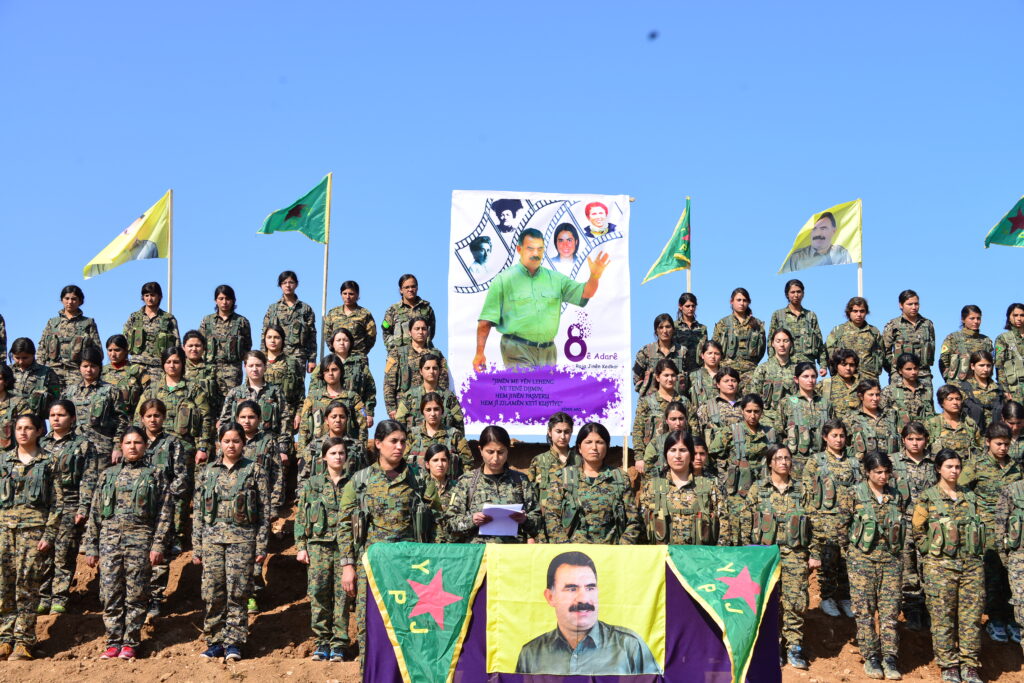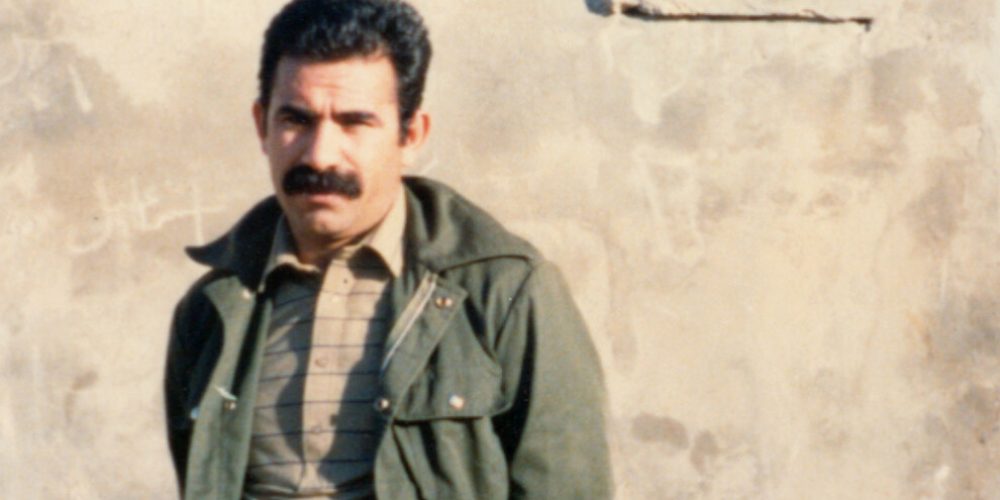Prison Writings and Paradigm Shifts
During his time in prison, Öcalan underwent a serious ideological shift. In the years that followed his imprisonment, Öcalan published several books, which he submitted to the European Court of Human Rights (ECHR) as defence writings. While in prison, Öcalan developed the idea of democratic confederalism. This model entailed the self-organization of each ethnic group within a confederal system, establishing democracy in multi-ethnic areas such as the Middle East. Based on grassroots organizing in communes and councils, it aimed to ensure that the decision-making power was horizontal, rather than vertical. Despite placing him in solitary confinement, the Turkish authorities at the beginning allowed his lawyers and peace missions to visit Öcalan on the prison island. However, total isolation was gradually imposed, until the point that no opportunity was given to him anymore to meet with his lawyers, family or anybody else than the prison staff. This situation has been ongoing for the last four years. This marks a serious violation of human rights but human rights organizations, like the ECHR, have remained silent.
The Rojava Revolution
In 2011, uprisings took place in many Arab countries, including Syria, in which people demanded democracy and freedom. In the Kurdish areas within Syria there were already self-organized self-defense units with the name YXK (Yekitiya Xweparastine Kurdistane – Self-Defense Units of Kurdistans), in which also women took part. Having gained valuable experience, the YXK announced their transformation into the Peoples Protection Units YPG. On July 19, 2012, the Syrian Army was pushed out of Kobanê and an autonomous self-government was declared. Through years of educational work, the Kurdish population had gained the knowledge that was now needed to implement such democratic structures in the framework of democratic confederalism in the new liberated areas.
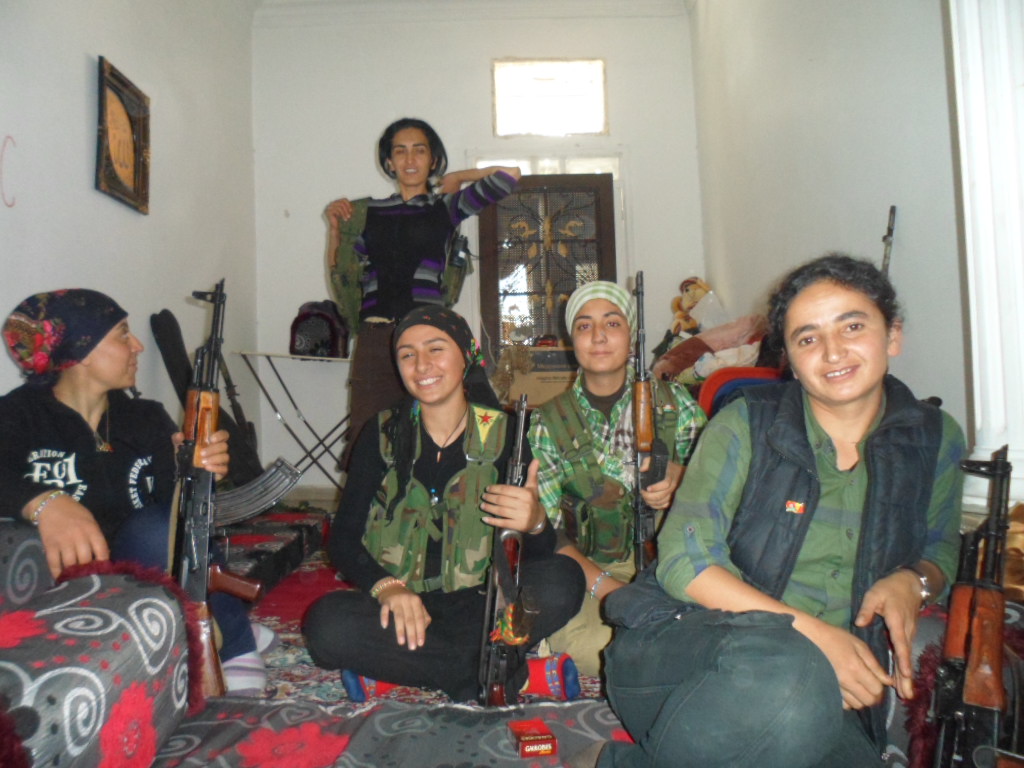
The women in the self-defense units had also gained more experience. On February 13, 2013, the first all-female battalion, called “Martyr Rûken battalion”, was founded in Afrin, consisting of 80 women. Following this example, on March 9, 2013, the “Martyr Adalet battalion” was established in Qamishli and on March 24, 2013, the “Martyr Dîcle battalion” in Kobanê. Women from the different cantons came together to discuss their role and duty within the revolution in many instances. It was during this time that it became clear to the women that they needed to organize as a women’s army in order to change society’s reactionary perceptions and to lead and shape the revolution. In 2013, between April 2 and 4, the women of YPG organized a conference with delegates from all the cantons. On April 4, marking Abdullah Öcalan’s birthday, they announced the foundation of an all-female army, the Women’s Protection Units YPJ. It is no coincidence that YPJ’s founding date falls on Öcalan’s birthday. The YPJ is based on the ideas that Öcalan presented in his model of democratic confederalism. Even though it is a military force, the main aim of YPJ is not only to stop the islamist organizations in the region, but alto to fight for women’s liberation and to build a true democratic and egalitarian society.
The fight against Daesh
As it is known worldwide, Daesh was able to make rapid territorial gains in Syria and Iraq and spread throughout the Middle East. In this time, Daesh could rely on Turkey’s support, which until today is considered a safe haven for them. For Turkey, it came in handy that a radical Islamic force was acting against the Kurdish regions. The liberation of Kobanê on January 26, 2015 marked the turning point in the fight against Daesh. The Turkish president Erdogan had already publicly announced on television that Kobanê had fallen, but the YPG, and YPJ units in particular, won the fierce battle and liberated Kobanê from the hands of ISIS. Since then, the liberation of Kobanê became a symbol of the Kurdish women’s willpower to fight back against any enemy and to achieve victory despite their limited resources. Furthermore, many more areas could be liberated from the hands of Daesh. Arab cities such as Raqqa and Tabqa, which had been under Daesh’s rule, asked for help. Together with Arab forces, these cities were liberated and today form part of the autonomous self-government.
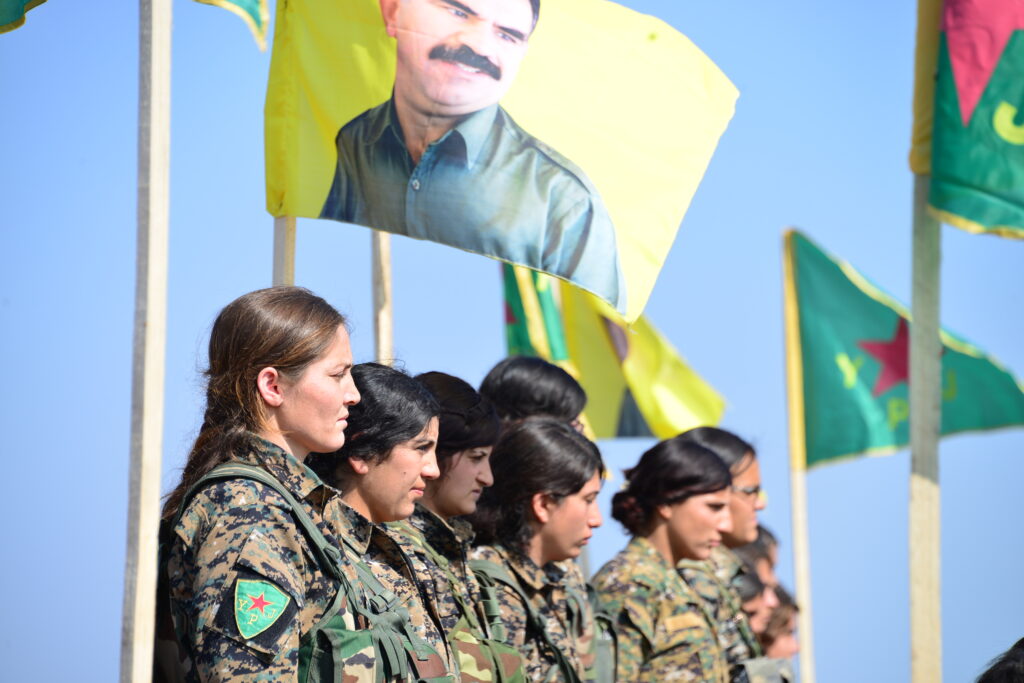
As YPJ we will continue to defend freedom
Today our units are known all over the world and thousands have joined our ranks to defend a free life. The basis of our struggle lies in the defense of all women and our fight is for all humanity. The YPJ became a symbol for all freedom-seeking women in the world. The Autonomous Administration of North and East Syria as able to establish a peaceful society in a country that was otherwise filled with the chaos of civil war. This was all the result of Abdullah Öcalan’s efforts. His philosophy and work are inseparable from the spirit of the YPJ and the Autonomous Administration of North and East Syria. More than 40 years ago, Öcalan started the struggle for a Kurdish identity, for freedom and democracy, for a peaceful coexistence of peoples and for a life in dignity and peace. This struggled led to the Rojava Revolution and even turned into a worldwide movement for women’s liberation, ecology, and direct democracy. Thanks to the values Öcalan created, we as YPJ have created possibilities within the impossible. With the strong will of women and the faith forged by the ideas and struggle of Abdullah Öcalan, we have built a democratic coexistence among the peoples of the Middle East.
The Kurdish identity and especially the Kurdish women’s identity was rebuilt from the ashes with much sacrifice by Abdullah Öcalan, and was consequently saved from assimilation and annihilation. The kidnapping of Abdullah Öcalan on February 15 is therefore a dark day for us. Since Öcalan’s arrest, the situation in Turkey, in Kurdistan and the entire Middle East, has deteriorated rather than improved. The Turkish state is still waging war in Kurdistan, directed against the Kurdish identity, culture and history, as well as against those who oppose its racist politics, seeking democracy and freedom. This is evident in its war against the self-governed areas in North and East Syria, in the massive human rights violations within its own borders, as well as in the continuing policy aiming to exterminate the Kurds and other minorities. It is not surprising that the Turkish state is bombarding the mountains of Southern Kurdistan (Northern Iraq) with banned chemical weapons in order to destroy the guerrillas. It is the women’s army within the guerilla that gave us, as YPJ, the inspiration to organize ourselves as a women’s army.
Öcalan’s became a symbol of the people’s wish for freedom
However, Öcalan is not only the leader of the Kurdish people. He has inspired various peoples in the Middle East, in oppressed nations, and especially women around the world to fight for freedom. This worldwide struggle was met with Turkey’s attempt to crush the Freedom Movement in Kurdistan through the complot against Abdullah Öcalan. Instead of ending people’s wish for freedom, a revolution began. We as YPJ are the living proof that, no matter how brutal the Turkish state’s war is against the freedom-loving people, our idea of an equal and just society will win. As YPJ we will continue our struggle for women’s liberation, a peaceful coexistence of peoples and a real democratization of the Middle East by any means necessary. Abdullah Öcalan became the leader for a free life. With his efforts, the values he created, and his philosophy he shows us the way to freedom. Therefore, we see it as our task to intensify our struggle on all levels and fight for his freedom.
